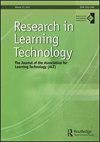Facilitating peer-led group research through virtual collaboration spaces: an exploratory research study
IF 1.2
Q2 EDUCATION & EDUCATIONAL RESEARCH
引用次数: 2
Abstract
Peer-led group learning is a variation of collaborative learning and is based on ‘small groups of students meeting regularly with a peer – one who has additional expertise in the subject matter – to work on problems collaboratively’ (Pazos, Micari, and Light 2010). In this study, we explored how a Slack team environment could be used in a blended course design to support students working remotely on individual research projects, helping them in collaborative trouble-shooting and problem-solving activities with their ‘near peer’. We drew on lessons learned from an initial trial (2017–2018 cohort) to inform a revised peer-led research design (2018–2019 cohort). Our findings demonstrate the potential of collaborative platforms such as Slack to support near-peer learning, providing distinct channels for questioning, ideas sharing and agile problem-solving support in response to individual queries. The peer-led support contributed to high levels of engagement with the project work and deeper learning, helping less confident students to learn from group members and achieve positive outcomes in their own project work. We discuss the necessary conditions for effective peer-led learning to take place within a virtual space – identifying the clear communication of instructional roles, socialisation of students and responsiveness of near peers as factors influencing the adoption of the targeted learning methods – which we addressed in our revised peer-led design.通过虚拟协作空间促进同伴领导的小组研究:一项探索性研究
以同伴为主导的小组学习是协作学习的一种变体,它是基于“一群学生定期与一个在某一主题上有额外专业知识的同伴会面,共同解决问题”(Pazos, Micari, and Light, 2010)。在这项研究中,我们探索了如何在混合课程设计中使用Slack团队环境,以支持学生远程进行个人研究项目,帮助他们与“近同龄人”合作解决问题和问题。我们从最初的试验(2017-2018年队列)中吸取了经验教训,为修订的同行主导的研究设计(2018-2019年队列)提供了信息。我们的研究结果证明了Slack等协作平台在支持近同伴学习方面的潜力,为提问、想法分享和敏捷解决问题提供了独特的渠道,以响应个人问题。同伴主导的支持有助于高水平地参与项目工作和深入学习,帮助缺乏自信的学生向小组成员学习,并在自己的项目工作中取得积极成果。我们讨论了在虚拟空间中进行有效的同伴主导学习的必要条件-确定教学角色的明确沟通,学生的社会化和近同伴的响应能力作为影响采用目标学习方法的因素-我们在修订的同伴主导设计中解决了这些问题。
本文章由计算机程序翻译,如有差异,请以英文原文为准。
求助全文
约1分钟内获得全文
求助全文
来源期刊

Research in Learning Technology
EDUCATION & EDUCATIONAL RESEARCH-
CiteScore
6.50
自引率
0.00%
发文量
13
审稿时长
20 weeks
 求助内容:
求助内容: 应助结果提醒方式:
应助结果提醒方式:


